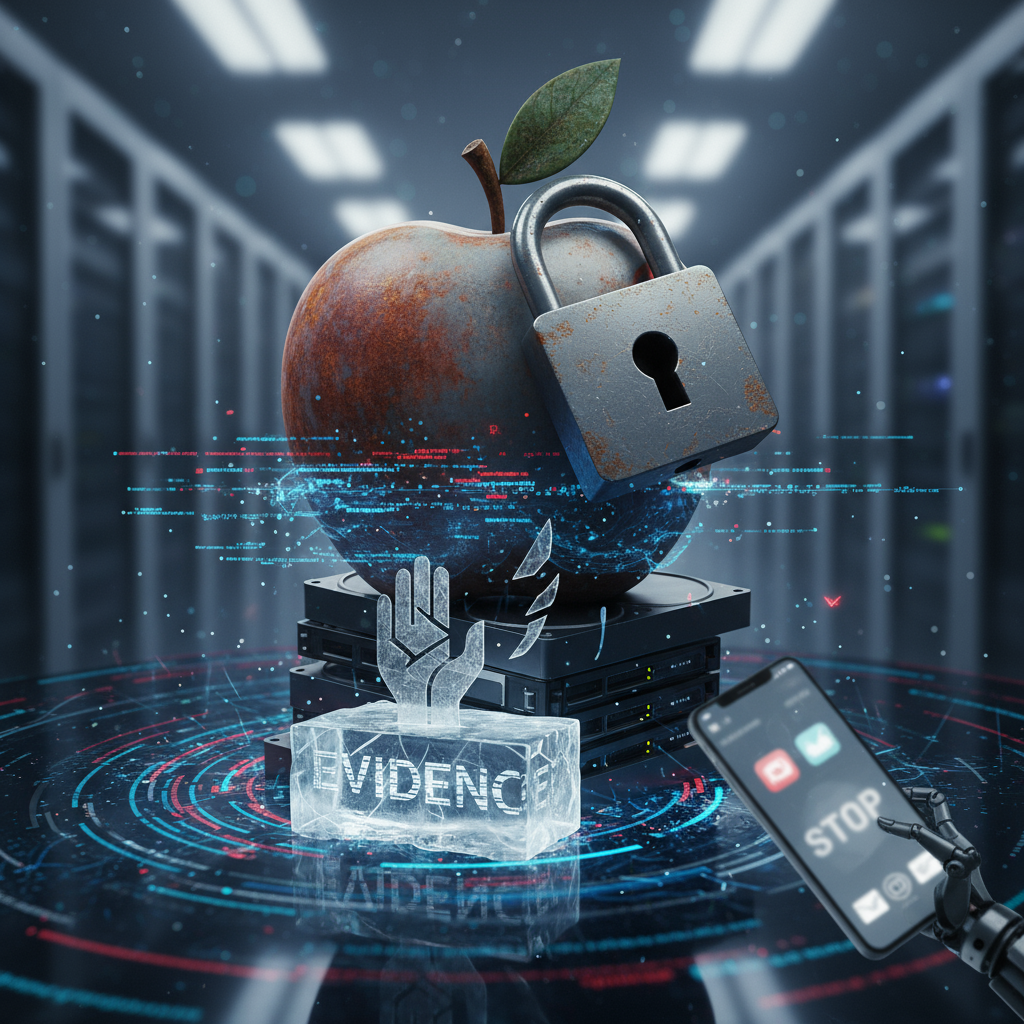Apple’s Stance: When Archiving Evidence Becomes Controversy

In an increasingly digital world, the lines between activism, technology, and corporate responsibility are often blurred. We rely on our devices for everything from communication to documenting the world around us. So, when a tech giant like Apple bans an app designed to preserve evidence of potential human rights abuses, it raises significant questions about censorship, transparency, and the role of powerful platforms in societal discourse.
This is precisely the situation surrounding “Eyes Up,” an app with a clear mission: “to preserve evidence until it can be used in court.” The app, which simply archived videos of alleged ICE (Immigration and Customs Enforcement) abuses, found itself swept up in what appears to be a broader crackdown by Apple on “ICE-spotting” applications. This decision by Apple has sparked a lively debate online, leaving many to wonder where the line is drawn between safety, policy, and the fundamental right to document injustice.
The Purpose of Eyes Up: Archiving for Justice

The essence of Eyes Up was its archival function. It wasn’t designed to facilitate direct confrontation or to actively track ICE agents in real-time. Instead, its core utility lay in providing a secure, reliable repository for video evidence that immigrants and their allies might capture. In situations involving potential abuses of power, reliable documentation is paramount. Such evidence can be crucial in legal proceedings, advocacy efforts, and holding institutions accountable.
For vulnerable communities, particularly those who may not feel safe engaging directly with authorities or who lack immediate access to legal counsel, an app like Eyes Up offered a lifeline. It democratized the ability to collect and safeguard evidence, transforming a smartphone into a powerful tool for justice. The app’s stated goal of preserving evidence for court use underscores its commitment to due process and the legal system.
The existence of Eyes Up highlights a growing need for independent, verifiable documentation in an era where misinformation can spread rapidly. It aimed to provide a counter-narrative to official accounts, ensuring that individual experiences and alleged transgressions were not simply dismissed or forgotten due to a lack of concrete proof. Its design emphasized neutrality in its function: gathering and storing data.
Apple’s Crackdown on “ICE-Spotting” Apps
Apple’s action against Eyes Up isn’t an isolated incident. The company has reportedly engaged in a broader crackdown on apps perceived as “ICE-spotting,” leading to a chilling effect on app developers and activists alike. While Apple has not always provided extensive public explanations for these removals, such actions often cite violations of App Store guidelines related to user safety, privacy, or the promotion of illegal activities.
The ambiguity surrounding “ICE-spotting” – what exactly constitutes it, and why it might violate guidelines – is a point of contention. Is simply archiving publicly documented events considered “spotting”? Does providing a platform for information sharing inherently breach safety protocols if that information pertains to government agencies? These are questions that deserve clearer answers from Apple.
Critics argue that a blanket ban on such apps, even those like Eyes Up which have a passive archival function, can be perceived as stifling free speech and hindering efforts to promote accountability. It raises concerns about Apple’s role as a gatekeeper of information and whether its corporate policies inadvertently protect certain powerful entities from public scrutiny. The lack of detailed transparency around these decisions only fuels speculation and mistrust.
The Broader Implications: Censorship, Accountability, and Platform Power
This incident transcends the specific case of Eyes Up and ICE. It touches upon profound questions about censorship in the digital age, the imperative for governmental accountability, and the immense power wielded by tech platforms. When a company like Apple can unilaterally remove an app from its ecosystem, it controls access to billions of users and can effectively silence voices it deems problematic, for reasons that may not always be clear or universally agreed upon.
The principle of documenting potential abuses by those in power is fundamental to a functioning democracy. Citizen journalism and the use of technology to record events have become crucial tools for transparency and justice, especially in situations where traditional media may not be present or where official narratives are questioned. Banning tools that facilitate this documentation, even indirectly, can erode public trust and empower those who wish to operate without oversight.
Moreover, this situation highlights the complex ethical tightrope walked by tech companies. On one hand, they are expected to maintain safe platforms and adhere to legal frameworks. On the other, they are increasingly seen as stewards of information and free expression. Balancing these responsibilities requires nuance, transparency, and a robust framework for decision-making that is publicly understood and consistently applied, particularly when human rights are at stake.
What This Means for the Future of Activism and App Development
The ban on Eyes Up is a stark reminder of the challenges faced by developers creating tools for social justice and activism. It sends a message that even applications with seemingly benign, evidence-gathering functions can be caught in the crosshairs of platform policy. This could lead to self-censorship among developers, hindering the creation of innovative tools designed to empower marginalized communities and hold power accountable.
For activists, it underscores the fragility of relying solely on centralized platforms for their advocacy. It encourages the exploration of decentralized alternatives or strategies that are less vulnerable to unilateral corporate decisions. The pursuit of justice often requires resilience and adaptability, and this incident certainly calls for both.
Ultimately, while Apple is a private company with the right to set its own terms, its decisions have far-reaching public consequences. As technology becomes more intertwined with every aspect of our lives, the expectation for transparency and ethical responsibility from tech giants will only continue to grow. The case of Eyes Up serves as a critical point of reflection on these complex issues, urging a broader conversation about where power lies and how it should be exercised in our digital society.

